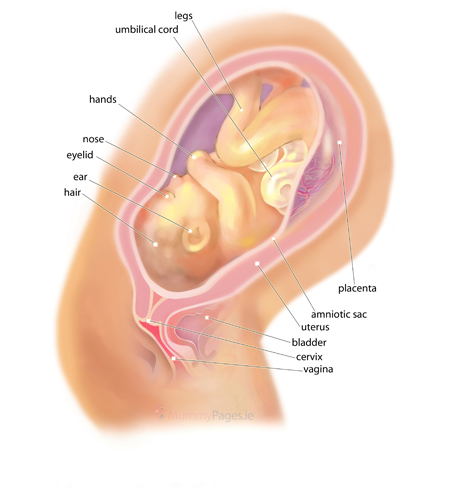You have made it to week 40, and if you have not already started labour, you will very soon! Most women start labour within one week of their due date. In fact, only about 5 percent of all babies are born in the week of their due dates.

Your Baby this Week

Your baby is now around the size of a watermelon.
During week 40 of your pregnancy, your baby weighs around 3.4kg (7.5 pounds) and measures somewhere in the vicinity of 51cm (20 inches). (Remember, these weights and measurements are only averages. All babies are different sizes and lengths depending on many factors. Even the measurements that your doctor takes on your belly are not exact - only ultrasound measurements can come close to the real size and weight. Nevertheless, for the most part, these weekly average measurements give you a good indication of your baby’s size.)
Your baby is definitely getting impatient now. You can probably tell by the movements that she is getting pretty cramped in your womb, especially at night when you are trying to sleep. For months now, night-time was the time that your baby would be fairly active. Now that she has no room, her movements can become uncomfortable during the night.
At this stage of your pregnancy, just about all of the vernix (the cheesy substance that covers your baby and protects her from the harsh amniotic fluid) is gone and your baby has close to 15 percent body fat.
Your baby is positioned at the cervix and ready to make the journey into the world. She is just waiting for your body to start the labour process.
During labour, your baby’s head will first move into the birth canal as the cervix begins to dilate. Then, during the active labour, when your cervix is fully dilated, the contractions will get stronger and stronger and eventually, along with your pushes, your baby will move through the birth canal and be delivered.
Your Body this Week

In this 40th week of your pregnancy, you probably have some very overwhelming feelings at times. It’s no wonder. Your hormones are raging in preparation for the birth and you are tired and just ready for this to happen. Don’t feel guilty about these feelings. It is natural to have them.
You should probably stick pretty close to home this week, just in case you go into labour. If you do have to go somewhere, put your packed bags in the trunk so they are ready to go. And, many doctors recommend not driving at this time. Besides the fact that it could be dangerous if you were to go into labour while driving, you might not even fit behind the steering wheel now!
At 40 weeks, you may be having some signs of pre-labour such as Braxton Hicks contractions, a vaginal discharge, or extreme exhaustion. Remember, in true labour, the pain will normally start in the lower back and then move to the abdomen unlike Braxton Hicks contractions which are only felt I the front of the abdomen. Additionally, true labour pains hurt more when you move around, whereas Braxton Hicks contractions go away when you move around. The best sign that labour is starting is when your water breaks. After that, you should be starting labour soon. If your water breaks, but your labour does not progress, contact your doctor right away.
If you have not yet started to show signs of pre-labour yet, your doctor may recommend that you have a non-stress test. This is a test that is given to make sure that your baby is getting enough oxygen and has a strong heartbeat. They also will check to make sure that the baby’s nervous system is responding correctly.
If it is necessary, your doctor could suggest that your labour be induced. This is usually only in the case that your health or the baby’s health is at risk. If you have had a high risk pregnancy due to an illness such as diabetes or other complications which may prohibit you from a natural birth, you may require a caesarean section delivery.
Pregnancy Tip
If you have a family dog, he was probably ‘your baby’ prior to your pregnancy. When you come home with a new baby that will be getting all the attention, your dog might get pretty jealous. In addition to hurt feelings, your dog will be curious about the baby. Pet experts agree that it is a good idea to send something home that has the baby’s scent on it before you get discharged. The little hats that are put on all newborns work well for this. This way, your dog can get used to the scent before he meets your baby.









